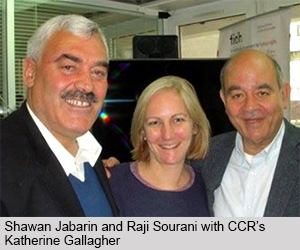

 |
 |
|
|
Trouble seeing this email? Read in your browser.
In This Issue:
First-hand reports from the ground in PalestineCCR is thrilled to be hosting prominent Palestinian human rights defenders Raji Sourani and Shawan Jabarin for a two-week visit to the U.S., the directors of the Gaza-based Palestinian Centre for Human Rights (PCHR) and Ramallah-based Al Haq, respectively. This is only the second trip each has made to the U.S. in the last dozen years, due to travel restrictions, and their first trip to the U.S. together. If you’re in the New York City area, please join us for a very special event this Wednesday, April 13, with Raji and Shawan sharing their from-the-ground perspectives on Gaza-under-closure and the very dynamic situation in the West Bank, including East Jerusalem. The event will also feature Columbia University scholar Rashid Khalidi discussing the role of U.S. policy towards Israel and Palestine, and is moderated by CCR Board Chair Katherine Franke. A full list of events featuring Raji and Shawan in New York – with CCR Executive Director Vince Warren at CUNY Law School tonight and with the award-winning journalist Amira Hass at NYU Law School tomorrow – as well as in Boston and Washington, D.C. – including a discussion with the Institute for Policy Studies’ Phyllis Bennis on Sunday, April 17 – is on the CCR events calendar. CCR’s work in bringing Raji and Shawan to U.S. audiences is part of our long-standing support for and solidarity with the Palestinian human rights struggle and our efforts to challenge the impunity of the Israeli government’s violations of international law related to its illegal occupation of Palestine and U.S. complicity in the occupation. The latest challenge to that impunity is now before the International Criminal Court. A brief look back at one piece of our past work related to Palestine is below. For an overview of our current work, visit the CCR website. 
CCR at 50: Challenging Israel’s violations of international lawCCR’s unique blend of expertise in international and constitutional law has been a critical component of our long-standing work in support of Palestinian human rights and challenging Israeli violations of international law. In particular, we have used the Alien Tort Statute (ATS), which allows foreign victims of serious international human rights violations to sue the perpetrators in U.S. courts, to seek accountability for Israeli government violations of international law, as well as state tort law. In 1992, CCR filed Abu-Zeineh v. Federal Laboratories, Inc., on behalf of family members of nine Palestinians killed from exposure to tear gas used by the Israeli military in the Occupied Palestinian Territory during the first Intifada, against the Pennsylvania company that manufactured the chemical. In Belhas v. Ya’alon, we sued the Israeli Army general responsible for the bombing of a UN compound in Qana where civilians had taken refuge during the Israeli invasion of Lebanon; the bombing killed over 100 people, and injured many more. In Matar v. Dichter, we sued the head of the Israeli Security Agency for his direct involvement in dropping a one-ton bomb on an apartment building in a densely populated Gaza neighborhood in the middle of the night, which killed eight children and seven adults, and injured over 150 other people in 2002. Perhaps best known is our case on behalf of the parents of American peace activist Rachel Corrie and four Palestinian families whose relatives were killed or injured when Caterpillar bulldozers demolished their homes. We brought Corrie v. Caterpillar because the company had long known that its 60-ton armor-plated bulldozers provided to the Israeli military were used to commit human rights abuses. CCR partnered with PCHR’s Raji Sourani on Abu-Zeineh, Matar and Caterpillar. This work connects to both our broader body of human rights work using the ATS to seek redress on behalf victims and survivors of serious human rights violations and oppression all over the world, and other work in support of the Palestinian struggle. This work also includes support of U.S. solidarity activists who are often targeted for their advocacy. An overview of all of our Palestine solidarity work is here. |